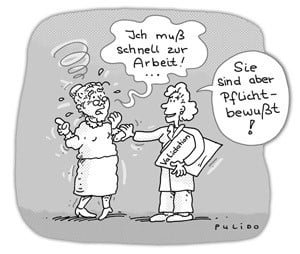Alzheimer’s disease – Dementia

If you imagine all your learnt skills, interests, talents, character traits etc. as books in a bookcase … and then more and more books fall over, or even fall out of the bookcase completely; that’s dementia!
A good image of Alzheimer’s dementia from the film Honig im Kopf by Til Schweiger
What actually is dementia?
I’m forgetful – do I have dement ia?
We are all forgetful from time to time, some a little more, others a little less often. So there’s no need to worry if you occasionally forget a name or misplace your keys from time to time. However, if you notice that your forgetfulness is increasing and such things occur very often and in different areas of everyday life, it is advisable to consult your GP. The alarm bells should ring at the latest when strange situations accumulate, e.g. the wallet is found in the fridge after a long search or the supposedly stolen jewellery is suddenly in the oven, because this can no longer be considered normal forgetfulness. However, memory loss is only one of the symptoms of dementia. There can be many other symptoms.
What is the difference between dementia and Alzheimer’s?
The terms Alzheimer’s and dementia are often considered to be synonymous, but this is not correct. Dementia is only the most important symptom of Alzheimer’s disease. The correct term would actually be Alzheimer’s dementia, which is just one form of dementia, albeit the most common. Around 60% of all dementias are caused by Alzheimer’s dementia.
Dementia is the generic term for more than 100 different diseases that affect the function of the brain. Dementia is a disorder of short-term memory, accompanied by other deficits in the areas of consciousness and emotions.
Gradual progression
It usually develops gradually, i.e. it begins with limitations in the ability to memorise and learn, then extends over large parts of the memory and finally also affects the long-term memory. Dementia patients in the final stage have lost almost all of their learnt skills and abilities. This explains why the care and nursing needs of such people can be enormous. The disease was named after the doctor Alois Alzheimer, who first described it in 1906 after noticing characteristic changes in the brain of a deceased patient.

Reversible forms of dementia
Certain physical and mental illnesses can cause disorders similar to dementia, but without definitive damage to the brain without definitive damage to the brain, provided that the triggering factors are are corrected or treated in good time. The most important causes of dementia-like symptoms are depression, metabolic disorders and alcohol and drug abuse Alcohol and drug abuse. These so-called secondary dementias are usually curable if the cause is treated!
More interesting facts about Alzheimer’s dementia
Primary dementia
Alzheimer’s dementia, on the other hand, is one of the so-called primary dementias, in which the dementia-related behaviour is directly attributable to brain changes. Like other primary dementias (vascular dementia, Lewy body dementia, etc.), Alzheimer’s dementia is not reversible according to conventional medicine, but the disease can be slowed down or the symptoms improved. Alzheimer’s disease almost exclusively affects older people. As a result of population trends in western industrialised nations, with people living longer and longer, the risk of developing Alzheimer’s disease is also increasing.
Disruption of the balance of Messenger substances
Alzheimer’s dementia is also referred to as neurodegenerative dementia Dementia. The clinical picture results from a disturbance in the balance of messenger Messenger substances in the human brain. In particular, the concentration of the neurotransmitter glutamate is concentration is greatly altered, so that this imbalance causes Imbalance causes more and more nerve cells in the brain to die. As a rule, this affects affected by this are regions that are very important for memory and Memory and orientation.
A Defect in the nerve cells deletes learnt skills
The causes of dementia have not yet been conclusively clarified and the opinions of doctors differ. Microglia cells, which are part of the immune system in the brain, can be detected in increased numbers in Alzheimer’s, so it could also be an inflammatory disease of the brain. The fact is that dementia patients have an altered brain structure. The cause of dementia is therefore a defect in the nerve cells; the nerve cells lose size and, as a result, connections to neighbouring nerve cells. Memory and cognitive performance become increasingly impaired and learnt skills and abilities are gradually erased.

Symptoms and effects
Forgetfulness
As already mentioned, forgetfulness is probably one of the of the first and most obvious symptoms in the early stages of dementia. Appointments, names and events are forgotten and events are forgotten and everything that is not nailed down is misplaced. With in the case of moderate dementia, memory lapses become more frequent and are increasingly more and more noticeable to outsiders. In the final stage, those affected then recognise no longer recognise loved ones, such as their own children or spouse!
Behavioural changes, depressive moods
At around the same time, other symptoms begin to appear that initially resemble a depressive episode, such as mood swings, the loss of long-standing interests and hobbies, slight irritability and a flattened emotionality. However, severe personality changes can also occur and those affected can sometimes react with contradictory behaviour patterns. People who used to be friendly become aggressive, loud and quick-tempered, only to become insecure, tearful and anxious the next moment. Alzheimer’s patients tend to have completely unpredictable mood swings, which can change frequently throughout the day.

Restriction in communication
In the progression, dementia manifests itself with restrictions in communication Communication. Those affected can no longer remember what has been said, forget agreements and lose their personal tone. With the As the disease progresses, there are further deficits in the areas of language Language, such as word-finding difficulties and a general decrease in vocabulary vocabulary. Those affected therefore find it difficult to follow a normal everyday conversation everyday conversation. There are often misunderstandings and, depending on temperament, anger is expressed Anger is expressed. Word creations also occur when the correct word word cannot be found (e.g. Backding instead of Backofen).
Problems with spatial and temporal perception and orientation
Restrictions in spatial perception can also occur. Sufferers often no longer know where they are and appear disorientated, especially in changed or unfamiliar surroundings. Later in the course of the disease, however, they may also become disorientated in familiar surroundings. This means that affected people can no longer find their way around their own home! Or they wander around their home town and can no longer find their way home.
The loss of abstract thinking also leads to a loss of a sense of time, for example, and the time of day can no longer be interpreted correctly. In the beginning, it becomes impossible to keep appointments and later in the course of the disease, night can suddenly become day or dinner can become breakfast!

Problems with motor skills
A full-blown dementia also causes motor difficulties. Those affected move unsteadily, their movements become stiff and slow and those affected are at risk of falling. Practised movement patterns are lost lost, both in gross and fine motor skills. As a result, those affected can no longer write or eat independently. But also favourite activities such as knitting are no longer mastered! mastered!
Dealing with dementia patients
A challenge!
From these complex and very drastic symptoms, it is easy to deduce that dealing with dementia patients and caring for them requires a high level of expertise and a great deal of sensitivity! It requires good empathy, respect and love for the other person and often a large portion of humour is not out of place. Of course, humour is not needed to make fun of the person who is ill, but to manage unusual situations in a positive way. A “thick” skin is also an advantage, because it is not always easy when a person with dementia suddenly insults you or perhaps even becomes violent. You should try not to take such incidents too personally and try to understand the cause of the behaviour. Such behaviour can often be handled quite well by taking the person seriously and validating them.

Validate
Validate means “appreciate, accept, embrace”. You try to sense people’s emotions and orientate yourself to their personal world of perception and experience. This can mean not contradicting people, even if you know that you are “in the right”. If, for example, a person with dementia always says “mum” to someone, it can offend or confuse them if you react reprovingly or even explain that their mother died a long time ago, etc. Validation can be very challenging, especially if you as a (caring) relative are constantly around the person with dementia. As a carer, seek help early on so that you are relieved. Also think about your own needs.

Some tips to make encounters with dementia sufferers easier
- Make eye contact and take the time to listen carefully.
- Don’t speak too quickly and use simple sentences.
- Show understanding if the other person has difficulty communicating something to you. Help carefully and kindly, for example by suggesting missing words.
- Take the person seriously and show interest in their concerns and fears.
- Do not contradict incomprehensible statements or stories.
- Do not take accusations personally, remain calm and avoid rushing.
- Find out what the sick person used to enjoy doing and talk about it or, if possible, do the hobby with the person.

Good news
The human mind remains functional!
It has been observed that people with a spiritual background can react strongly to familiar songs, choruses or prayers. Even if the disease is already well advanced. As Alzheimer’s disease attacks the human brain, the soul is also blocked, but the human spirit remains fully functional! This is of course good news for relatives who know what spiritual music their loved ones used to listen to and sing, or what prayers or Bible verses they have memorised. It has been observed that such songs or verses can bring a smile or tears to an otherwise almost impassive face. Try it out!

A healthy diet and the importance of vital substances
A balanced and healthy diet, which provides a supply of all the vital substances that are important for physical health, can prevent many illnesses and support the body when it is ill. As such a diet is hardly possible nowadays, in certain cases specifically selected food supplements with natural vital substances can offer help.